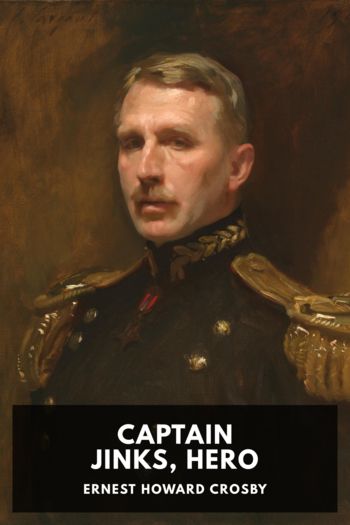Captain Jinks, Hero by Ernest Howard Crosby (story read aloud txt) 📕

- Author: Ernest Howard Crosby
Book online «Captain Jinks, Hero by Ernest Howard Crosby (story read aloud txt) 📕». Author Ernest Howard Crosby
“The horrid wretch!” she exclaimed, throwing her arms about his neck and kissing him. “I’m so glad they didn’t break your nose.”
“Are you really?” he asked, and as he read the truth in her eyes a weight was rolled from his soul.
He showed her the little lead officer with the plume, which he always carried as a mascot in his breast-pocket, and also the two hazing photographs which kept it company. She was delighted with them all.
“Oh! you will be a hero,” she cried. “I am sure of it, and what a time we shall have of it, you dear thing!”
With his spare time thus occupied Sam did not see much of Cleary, who now shared another tent. One afternoon late in September he was on the way to the gate of the hotel grounds where he was accustomed to wait until Miss Hunter came out and joined him, when Cleary called him aside.
“Sam,” he said, “I’ve got something of importance to say to you. Can’t you come with me now?”
“Can’t,” said Sam. “Miss Hunter’s waiting for me.”
“Well, then, beg off tomorrow afternoon. I must have a long talk with you.”
“All right,” answered Sam reluctantly. “If I must, I must, I suppose.”
The next day found Sam and Cleary walking alone in the woods engaged in deep conversation.
“Sam, what would you say to going to the war?” asked Cleary.
“I’d give anything to go!” exclaimed Sam.
“You wouldn’t want to stay on account of that girl of yours?”
“No, indeed; she would be the first to want me to go.”
“Then why don’t you go?”
“How can I?” said Sam. “We’ve got three more years here. That ties us down for that time, and by the time that’s over the war will be over too.”
“That’s what I think, and I’m sick of this place anyhow. I’m going to resign.”
“Resign!” cried Sam. “Resign and give up your career!”
“Not altogether, old man. Don’t get so excited. What’s the use of staying here? We’ll get sent off to some out-of-the-way post when we graduate, and perhaps we’ll get to be captains before our hair is white, and perhaps we shan’t; and then if a war breaks out we’ll have volunteers young enough to be our sons made brigadiers over our heads. Aren’t they doing it every day? I’m not going to waste my life that way. I want to go to the war now, and I mean to go as a newspaper correspondent.”
“Oh, Cleary!” exclaimed Sam reproachfully.
“Tut, tut, Sam. You’re not up to date. We’ve got no field-marshals in our army and the newspaper correspondents take their place. Their names are better known than the generals, and they advertise each other and get a big share of the glory; and then they can always decently step aside when they’ve got enough. They needn’t stay on the fighting-line, and that’s a consideration. No, I’m sick of ordinary soldiering, but I’m willing to be a field-marshal. My father has an interest in the Metropolitan Daily Lyre, and I’ve written to him for an appointment as correspondent in the Cubapines. What I’ve learned here will help me a lot. But I want you to go with me.”
“Me? Go with you? Do you think I’d be a newspaper correspondent?”
“No, of course not. It never entered my head. But why don’t you get a commission in the volunteers from your uncle? He can get just what he wants, and they’re talking of him for Secretary of War. All you’ve got to do is to resign here and apply for a commission as colonel. Then you’ll probably land as a major, or a captain at any rate. By the time the war is over, you’ll be a general, if I know you, and then you can be appointed captain in the regular army on retiring from the volunteers, when our class is just graduating. You’re just made for a successful soldier. You’ve got the ambition and the courage, and you’ve got just the brains for a soldier. You don’t want to remain a lieutenant until you are fifty, do you?”
There was great force in Cleary’s argument, and Sam knew it. East Pointers were scandalized at the manner in which outsiders were jumped into important commands in the field, and when engagements took place the volunteers came in for all the praise, while the regulars who did almost all the work were hardly mentioned.
“I’ll think it over,” said Sam. “I’ll speak to Marian about it. It’s very kind of you to think of me.”
“Not a bit,” said Cleary. “I’m looking out for myself. If you go as a major and I go as correspondent, I’ll just freeze to you and make a hero of you whether you will or not. I’ll make your fortune, and you’ll make mine. I’ll see that you get a chance, and I know that you’ll take it if you get it. You’re just cut out for it. Now get permission from the young woman and we’ll call it a go.”
The following afternoon Sam walked over the same ground, but this time it was Marian who accompanied him. She was enthusiastic over Cleary’s proposition.
“Just think of it! You’ll come back a hero and a general, and I don’t know what not, and we’ll get married, and the President will come to the wedding; and then we’ll have our wedding tour up here, and the corps will turn out and fire a salute, and





Comments (0)